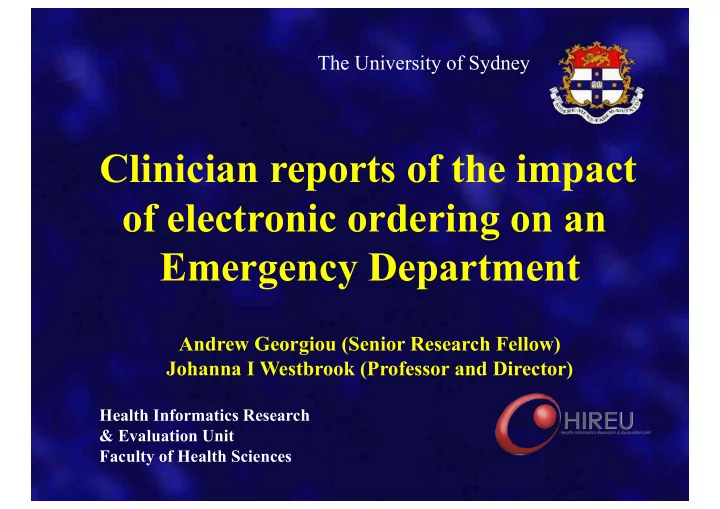

The University of Sydney Clinician reports of the impact of electronic ordering on an Emergency Department Andrew Georgiou (Senior Research Fellow) Johanna I Westbrook (Professor and Director) Health Informatics Research & Evaluation Unit Faculty of Health Sciences
Emergency departments – information crossroad
CPOE systems – the promise? • Rapid information retrieval, efficient data management • Incorporate decision support mechanisms (Bernstein et al. 2005 Acad Emerg Med) • Potential to improve quality of care (Aronsky et al 2007 AMIA)
The impact of eHealth on Quality and Safety “ …whilst the number of IT applications in healthcare and software programmes is growing (high dissemination), we still have insufficient understanding of who, why, and under what conditions, such interventions might work (low evaluation)” Car et al. (2008) A systemic overview and synthesis of the literature. London Imperial College and The University of Edinburgh
Theory-based evaluation A frame of reference that helps us to understand the world, a guideline for analysing phenomena and comprehending their significance
Black box versus theory based evaluation Evaluation studies cannot avoid theory because by their very nature they seek to discover whether something works or not. Even the introduction of a new IT system is based on a theory - that its introduction will make things better.
Kaplan’s 4Cs framework The interaction between technology, people, tasks and organisational structure 1. Communication 2. Care 3. Control 4. Context
Research setting • ED with 66-bed capacity in large Sydney suburban teaching hospital • 150-180 patients per day • Cerner Millennium PowerChart (2004.01) • May to August 2006 (four months after implementation • Area Health Service approval
Research methods • Doctors - 7 semi structured interviews and one focus group (nine participants) • Nurses – 4 focus groups (16 participants) • Chain referral sampling • Concurrent data analysis (NVivo) employing grounded theory techniques
Expectations We’ve worked with computer systems here for years now and they’re not foolproof. You’ve got down time, there’s a lot of things, so I didn’t really have the expectations of it, that it would be the solution to our problems. (ED Registered Nurse)
Responsibility shifts • Additional data entry tasks and responsibilities • Protocol driven nurse order entry
Monitoring the test order process Whereas before in the old … system, if you sent down a blood test, as soon as it was logged in, as a test being done, it would say “to follow”, until you actually got a result. Whereas now, it says you’ve ordered it, but if you just go to look at the results, it just won’t give you any result until there is a result. It won’t say it is in the system; it’s not ready yet. (ED Staff Specialist)
System usability
System requirements You know - when you order this test you have to do this. It’s like yes of course I bloody know that, I’ve been ordering this test for 20 years. Like the X-ray box when you click X-ray, it will come up saying you have to order an X-ray for a particular part of the body. Really? Thanks very much, I know that. I mean they’re just useless bits of support. It just irritates people; it added nothing to the process. (ED consultant)
Kaplan’s 4Cs framework Theme Communication Care Control Context Expectations X Changes in X responsibility Monitoring the test X X order process System usability X X System requirements X X
Implications • Context-dependent factors • Selective and gradual deployment of decision support • Patient care consequences • IT implementation is a negotiated process
Thank you www.fhs.usyd.edu.au/hireu a.georgiou@usyd.edu.au
Recommend
More recommend